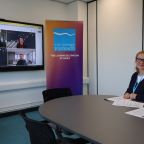
Secrets of Success: Excelling in Spanish Lessons with a Private Tutor
The process of mastering a new tongue is analogous to setting off on an adventure. Private tuition shines as a bright example of individualized instruction for learning Spanish, leading you by the hand through the language's complexities step by step.
Setting the Stage for Success: Choosing the Right Tutor
The foundation of efficient learning is finding an instructor you "click" with. It's not enough to locate someone with the right credentials; you also need to find someone whose teaching style and personality complement your own. A good teacher is priceless if they can make even the most difficult topic easy to understand.
When it comes to mastering a new language, not every shelter from the storm will do. Try to find a tutor who has experience giving "Spanish lessons with tutor." Proof of expertise, positive student feedback, and the capacity to modify instruction accordingly are all necessary components. They should be fluent in Spanish and much more than just a competent guide.
Learning a new language is not a one-size-fits-all endeavor. Your instructor should be able to tailor a study plan to your specific needs, one that capitalizes on your skills while compensating for your limitations. Private coaching, in contrast to the classroom, allows for individualized instruction.
The Roadmap to Mastery: Structuring Your Learning Journey
As you ascend, don't lose sight of your starting point. Create a plan to study Spanish that has attainable objectives. If you want to better your academic achievement, communication abilities, or both, it is important to define concrete goals.
Balanced Curriculum
A well-rounded education is essential. Students need not just a firm grasp of the language's grammar but also extensive opportunities to use it in authentic settings. Only someone who has mastered a language can understand and respond to all of its subtleties with ease.
Milestones and Feedback
It's important to keep tabs on a project's development at regular intervals. These checkpoints are not only useful for gauging your progress; they are also excellent opportunities for reflection and course correction. Keep in mind that the journey itself is a rewarding experience.
The Spice of Variety: Innovative Learning Techniques
Interactive Methods
Learning Spanish is about more than just memorizing phrases. Role playing, group discussions, and recounting interesting stories are all examples of interactive teaching methods.
Real-world Application
It's important to broaden your horizons beyond what you can learn from books. The language really shines in real-world circumstances, such as when you need to make a dinner reservation or when you watch a film in Spanish without subtitles.
Cultural Immersion
It is not enough to study a language in a vacuum, apart from its context of use. You could help your pupils learn Spanish and understand Spanish culture by exposing them to media in that language.
Overcoming Challenges: Dealing with Common Hurdles
Discovering oneself is an exciting adventure, but it's not without its challenges. So that your time in school goes well and you like it, let's go over some of the most frequent problems and how to overcome them.
Conquering Pronunciation Woes: Tricks and Tips for Mastering Difficult Sounds
Some of the most challenging aspects of learning a new language are the pronunciations of unfamiliar words. Some possible reasons for this phenomena are as follows:
- Listen and Repeat: If you really want to learn a language, you should surround yourself with it as much as possible. Try to reproduce the sounds as closely as possible.
- Use Phonetic Exercises: Tongue twisters and other phonetic activities can help you get better at pronouncing foreign sounds.
- Record and Compare: You may compare how you sound compared to native speakers by recording yourself and listening to the recording.
- Slow Down: Pronounce each phrase out loud slowly and deliberately first.
- Seek Feedback:Frequently seek the opinion of native speakers or teachers.
Grammar Gridlocks: Simplifying Complex Grammatical Concepts
Learning the grammar of a new language is essential, but it can be difficult at first. Improve your writing by making these grammatical changes:
- The regulations ought to be broken down into more manageable, smaller sections to make them less complex.
- Make full use of graphs, diagrams, and other visual aids.Even the most complicated grammar systems may be made understandable when presented graphically.
- Focus on comprehending and using grammatical principles in many settings, instead than trying to commit them to memory.
- Examining more frequently might perhaps enhance memory recall.
- To grasp the language completely, you must converse with native speakers.
Staying Motivated: Keeping the Flame of Learning Alive, Especially When the Going Gets Tough
It's crucial that you stay motivated because studying might be challenging. Ways to keep your readers interested:
- Set Clear Goals: Use the time constraints you set for yourself to keep track of your achievements. Setting specific objectives might aid in keeping you on course.
- Celebrate Small Victories: No matter how small your efforts may seem, know that they are appreciated and acknowledged.
- Stay Curious: Examine the material from several angles to add interest to your studies.
- Find a Learning Community: Look for other college students on the internet with whom you may connect and exchange knowledge.
- Remind Yourself of the ‘Why’: Remember your initial motivation for going on this trip and the benefits you want to get.
Both the educational process and the course materials provide challenges. If you apply these strategies, you may be able to change your unfavorable outcomes.
Beyond the Books: Enhancing Learning with Technology and Resources
Incorporate state-of-the-art hardware and software. You may improve your language-learning results by using supplementary resources like virtual reality headsets, software, and online games.
Extra Material: Use audio and video content, books, and the internet to improve your Spanish language skills. These resources may be used to supplement your tutoring sessions and help you apply what you learn.
Exercises and Assignments: Mastery, as the cliché goes, is the result of extensive practice. The greatest approach to learn something and keep it in long-term memory is to practice it over and over again (homework).
Making It Stick: Strategies for Long-Term Retention
Don't let it slip away. Consistent practice with NiceTutor is required to keep your Spanish skills at a high level.
If you want to recall new words, spaced repetition is the way to go. Prolonged intervals between evaluations have been shown to improve long-term memory retention.
Take part completely in situations that will call for the use of Spanish. You may improve your Spanish language skills by talking to native speakers, participating in language exchanges, and traveling to Spanish-speaking countries.
Embrace the Journey: Mastering Spanish with a Private Tutor
Learning Spanish with a private teacher is a time-consuming and involved process, but the rewards in terms of personal development and cultural understanding are well worth the effort. If you're learning a new language, keep in mind that any advancement, no matter how slight, is progress. The Spanish language and culture are yours to explore with the help of a dedicated instructor, a personalized study plan, and your own enthusiasm. You should stop hesitating and start seizing the life-changing opportunity of studying Spanish with a personal teacher.











